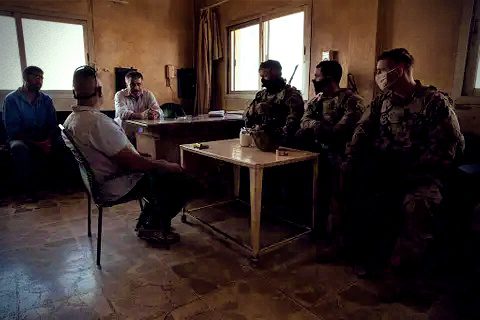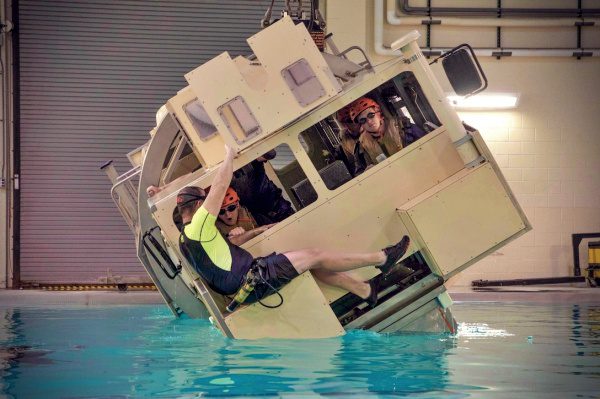Overview of court-martial appeals under the UCMJ
- Action by Convening Authority. Article 60, UCMJ; RCM 1107
- Action by the Judge Advocate General. Articles 66 and 69, UCMJ; RCM 1201
- Requirements for action on a court martial sentence
- Appeals. Deferment of confinement
- Assertions of Ineffective Assistance of Counsel
- Claims of post-trial cruel and unusual punishment
- Deferment of forfeitures
- Effectiveness of Military Defense Lawyers in the Post-trial Area
- Who may act – the person who convened the court
- General considerations
- Action on findings not required but permissible
- Action on sentence must
Appeals. General considerations
Not required to review for legal correctness or factual sufficiency. Action is within sole discretion of CA as a command prerogative.
RCM 1107(b)(3)(A). Must consider :
- Result of trial;
- SJA recommendation; and,
- Accused’s written submissions.
United States v. Davis , 33 M.J. 13 (C.M.A. 1991). How “detailed” must the consideration be? “Congress intended to rely on the good faith of the convening authority in deciding how detailed his ‘consideration’ must be.” United States v. Dvonch , 44 M.J. 531 (A.F. Ct. Crim. App. 1996). Failure to consider two letters submitted by DC requires new review and action. United States v. Osuna , 56 M.J. 620 (C.G. Ct. Crim. App. 2001). Record of trial returned to CA where there was no evidence that the CA considered clemency letter by DC.
United States v. Mooney , No. 9500238 (A. Ct. Crim. App. June 10, 1996) (unpublished). Court determined that fax received “in sufficient time to forward it . . . through the Staff Judge Advocate to the convening authority.” “Appellant’s articulate and well-reasoned RCM 1105 clemency letter through no fault of his own was not submitted to the convening authority on time. We do not have sufficient information to determine [whose fault it was] . . . as our function is . . . not to allocate blame. The quality of the clemency letter . . . gives rise to the reasonable possibility that a CA would grant clemency based upon it. Thus . . . the appellant has been prejudiced . . .” (emphasis in original). Action set aside and returned to CA for new PTR and action. Practice Pointer: Even if the government is not at fault, accused may get new SJAR and action. Send back to CA if record not yet forwarded for appeal.
United States v. Roemhildt , 37 M.J. 608 (A.C.M.R. 1993). CA and SJA not required to affirmatively state they considered recommendation of Family Advocacy Case Management Team (FACMT). Accord United States v. Corcoran , 40 M.J. 478 (C.M.A. 1994). United States v. Ericson , 37 M.J. 1011 (A.C.M.R. 1993). There must be some tangible proof that CA saw and considered clemency materials before taking action. United States v. Briscoe , 56 M.J. 903 (A.F. Ct. Crim. App. 2002) (post-trial affidavits from SJA and CA suffice, although not the preferred method – use an addendum).
RCM 1107(b)(3)(B). May consider:
Record of trial, personnel records of accused, and anything deemed appropriate, but if it is adverse to the accused and from outside the record, then accused must be given an opportunity to rebut. See United States v. Mann , 22 M.J. 279 (C.M.A. 1986); United States v. Carr , 18 M.J. 297 (C.M.A. 1984).
United States v. Harris , 56 M.J. 480 (C.A.A.F. 2002). CA properly considered accused’s pre-enlistment criminal history, some of which occurred while the accused was a juvenile, history documented in the accused’s enlistment waiver document contained within his Service Record Book (SRB), a personnel record of the accused which he had access to and could review during the clemency process. No requirement to provide the accused with prior notice that the CA would consider the document since the SRB was part of the accused’s personnel records and not “other matters.”
CA need not meet with accused – or anyone else. United States v. Haire , 44 M.J.520 (C.G. Ct. Crim. App. 1996). CA not required to give a personal appearance appointment to the accused. Even truer now, as this case relied on Davis , in which court had held that CA must consider videotape (no longer good law in light of 1998 statutory change). Requirement to “consider” only pertains to “‘inanimate’ matter that can be appended to a clemency request. We specifically reject the contention that a petitioner for clemency has a non-discretionary right to personally appear before the convening authority.” Id . at 526.
RCM 1107(b)(4). No action on not guilty findings.
RCM 1107(b)(5). No action approving a sentence of an accused that lacks the capacity to understand or cooperate in post-trial proceedings.
Military Sexual Assault Defenses: Military Defense Lawyer
Miscellaneous Court-Martial Appellate Cases Regarding Action
McCray v. Grande , 38 M.J. 657 (A.C.M.R. 1993). Sentence, for purposes of commutation, begins to run on date announced.
United States v. Foster , 40 M.J. 552 (A.C.M.R. 1994). Court does not have to treat ambiguous action ($214 per month) as forfeiture for one month; may return to CA for clarification of intent.
United States v. Muirhead , 48 M.J. 527 (N-M. Ct. Crim. App. 1998). The accused was sentenced to “forfeit all pay and allowances, which is $854.40 for 2 years,” and CA approved the same. Held: ambiguous sentence. CA under RCM 1107(d)(1) can return case to court for clarification of ambiguous sentence; if he does not, he can only approve a sentence no more severe than the unambiguous portion. Rather than return to CA, the NMCCA simply affirmed the unambiguous dollar amount.
Post-trial deals
United States v. Olean , 59 M.J. 561 (C.G. Ct. Crim. App. 2002). CA authorized to enter into post-trial deals where a rehearing is impracticable. In the case at bar, the CA agreed to approve a sentence of no punishment, dismiss the specifications which were set aside and returned for a rehearing, process the appellant for administrative discharge, and recommend a general discharge. In exchange, the appellant agreed to waive personal appearance before the separation board, remain on appellate leave, and waive any right to accrued pay, allowances, or travel entitlements.
Disposition of Record of Trial After Action. RCM 1111
- General Courts-Martial. ROT and CA’s action will be sent to the Office of The Judge Advocate General (OTJAG)
- Special Courts-Martial with an approved BCD will be sent to OTJAG.
- Special Courts-Martial with an approved BCD and waiver of appeal. Record and action will be forwarded to a Judge Advocate for review (RCM 1112).
- Other special courts-martial and summary courts-martial will be reviewed by a JudgeAdvocate under RCM 1112.
Common SJAR and Addendum Errors
- Inaccurately reflect charges and specifications (especially dismissals, consolidations).
- Inaccurately reflect the maximum punishment.
- Omit, misapply pretrial confinement ( Allen , RCM 305(k) credit).
- Omit, misapply Article 15 ( Pierce ) credit.
- Recommend approval of greater than 2/3 forfeitures for periods of no confinement.
- Recommend approval (in special courts-martial) forfeitures and fines (cumulatively) in excess of the court-martial’s jurisdictional limit.
- Add extraneous (and often erroneous) information.
Classified Evidence in a Court-Martial
-
- Classified cases are not easy, but early coordination and planning will help you set the conditions for success.
- Do not be intimidated by MRE 505 or CIPA.
- Remember: the OCA controls the information, and if you can’t gain release, you may
have to dismiss in the interests of justice.
Duties of Counsel. Article 38, UCMJ; RCM 502(d)(5)-(6); RCM 1103(b)(1)
Effectiveness of counsel in the post-trial area is governed by Strickland v. Washington, 466 U.S. 668 (1984), and United States v. Lewis, 42 M.J. 1 (C.A.A.F. 1995)
RCM 502(d)(5), Discussion, para. (F), Addresses the Trial Counsels Post-trial Duties
Prepare Report of Result of Trial. “Promptly provide written notice of the findings and sentence adjudged to the convening authority or a designee, the accused’s immediate commander, and (if applicable) the officer in charge of the confinement facility.”
Supervise preparation, authentication and distribution of the ROT. RCM 1103(b)(1).
Review ROT for errata. United States v. Ayers , 54 M.J. 85 (C.A.A.F. 2000). On appeal, appellant alleged that the ROT was not truly authenticated since the assistant trial counsel (ATC) executed the authentication. The ATC signed the authentication document that stated, “I have examined the record of trial in the forgoing case.” The ATC also made several corrections to the ROT. The defense claimed that for the authentication to be proper, the authenticating individual must state that the ROT accurately reports the proceedings. Also, defense claimed that an ATC cannot authenticate a ROT unless he is under the supervision of the TC (as required by RCM 502(d)(2)). The court disagreed, holding that by signing the authentication document, the ATC was stating that the ROT was correct. Also, since the Air Force Law Review defense did not allege any error in the ROT, or prejudice from having the ATC authenticate the ROT, no relief was appropriate.
Ensure the record of trial is served on the accused and counsel, as appropriate. RCM1104(b)(1), 1106(f)(3). See generally RCM 502(d)(5), discussion, para. (F).


